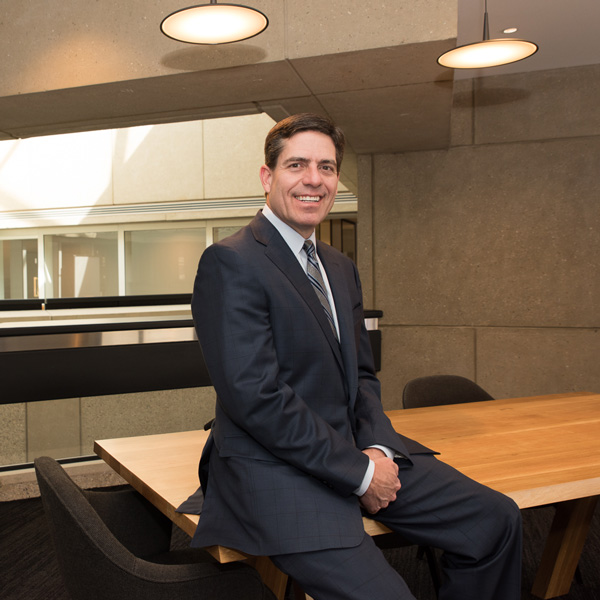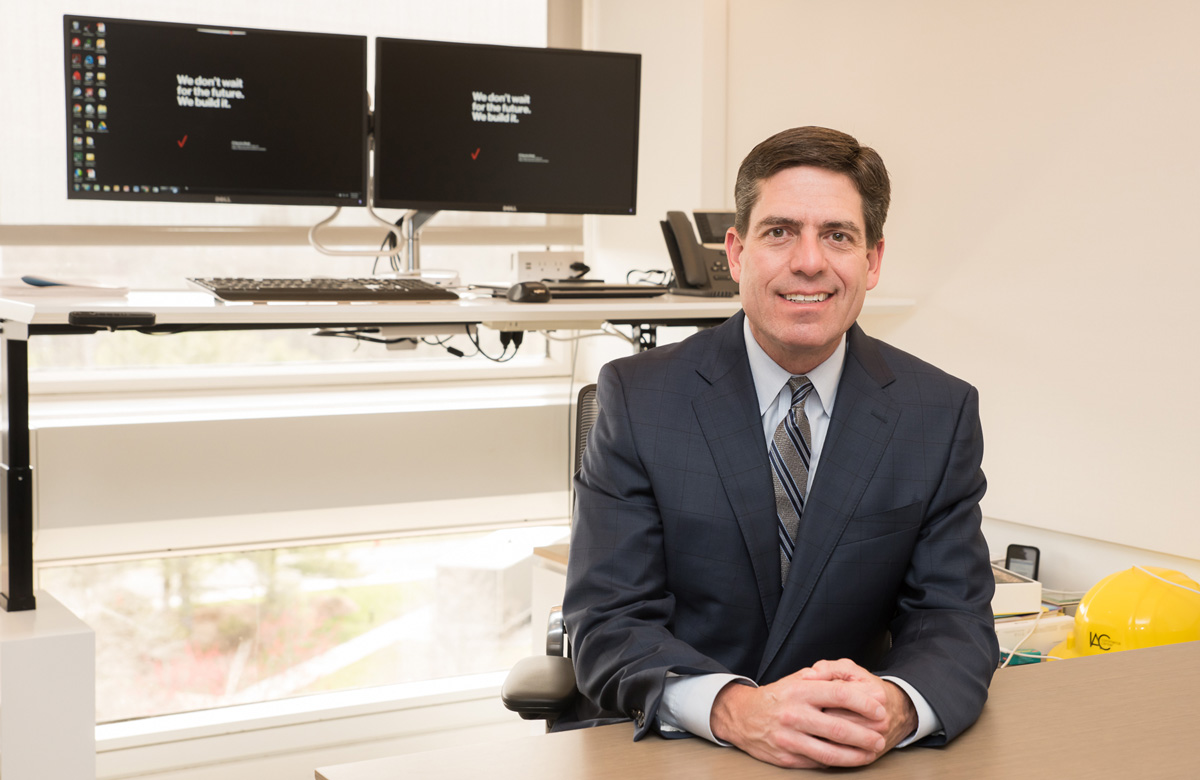What a Long, Strange Trip it's Been
By Terry Tush
Brady Connor stares out his Midtown Manhattan office, just blocks from Wall Street, and realizes he’s a long way from Albuquerque, New Mexico. He never would have dreamed that his path would lead to New York City and a leading executive position with one of the nation’s largest telecommunications companies.
But that road at times has been bumpy, including nearly 15 years ago when he was one of the federal government’s star witnesses in what was at the time the largest accounting scandal in United States history. Connor was head of corporate finance at WorldCom when executives at the company inflated assets by as much as $11 billion from 1999 to 2001, costing 30,000 people their jobs, leading to $180 billion in losses for investors and forcing the company to file for bankruptcy. Although Connor knew nothing of the fraud and conspiracy, the FBI and the U.S. Attorney’s Office for the Southern District of New York both sought his knowledge.
A number of WorldCom executives were charged, found guilty and spent time in prison, including Chief Executive Officer Bernie Ebbers, who was charged with nine felonies. Connor’s testimony was one reason his former boss was found guilty of all charges in 2005, and Ebbers remains in federal prison today under a 25-year sentence.
“I didn’t know this, but I was the originator of one of two pieces of physical evidence that linked Bernie to the actual fraud,” said Connor, who earned his MBA in 1993 from Oklahoma State University.
Connor remembers the week of the trial, which had the nation’s attention, as vividly as if it were yesterday. “I wouldn’t say I was scared but I was definitely nervous and anxious,” said Connor, who made frequent trips from his home in Atlanta to New York for interviews with the district attorney and FBI.

“I was sitting in the holding pen, and I had the FBI agents with me,” he said. “I was visibly nervous, so they started asking me if they could help me calm down, and I said, ‘I still don’t really understand why you guys are interested in me. I still don’t understand why all of this is happening to me.’ They said, ‘You’re part of Team USA. You’re here to enter evidence into court, and you’re one of the good guys.’
“I’m sitting there thinking, ‘It would have been nice if you would have told me that six months ago.’”
The WorldCom fraud was just one of several corporate accounting scandals that rocked the nation in the early 2000s, along with Enron, HealthSouth and Tyco.
“Now when you look back on it 15 years later that was a unique part and time in history of corporate America … and I was right at the epicenter of what was going on,” Connor said. “It wasn’t fun going through it but looking back it was one of those life experiences that you just can’t make up. Let’s put it this way: There’s not a lot that fazes me now, and I don’t get rattled very often.”
The company re-emerged as MCI and quickly re-established itself as a major player in the telecommunications game, and Connor was there to experience it. He was among the MCI executives invited to participate in the ringing of the opening bell at the NASDAQ when MCI was listed as a public company after it emerged from bankruptcy following the scandal.
“The pride and joy I had of standing up there was fantastic,” he said.
Within months, Verizon purchased MCI and the Connor family — wife Lynne and two daughters, Mary, 14, and Annie, 12 — was moving to New Jersey. He has held various leadership positions with Verizon across finance and the operations of the business, before being promoted in 2013 to president and chief investment officer of Verizon Investment Management Corp (VIMCO) and head of Verizon Capital Group (VCG). In that role, he was overseeing a $50 billion portfolio of retirement assets.
Last fall, Connor was promoted to senior vice president of investor relations, where he is the primary liaison within the investment community and Verizon’s shareholders.
“The appeal of moving over to investor relations is it’s one of the most highly visible jobs within Verizon,” the 49-year-old Connor said. “It’s an honor to be in charge of telling the Verizon story to the external community and representing Verizon on such a global scale.”
Or, as Connor says with a laugh, he’s gone from everyone being his friend to having few pals in his corner.
“When you have a $50 billion checkbook everybody is your friend, and now that I’m trying to convince them to buy Verizon and I don’t have the $50 billion checkbook as a part of my repertoire, it’s a little tougher to make friends,” he said.
In all seriousness, Connor says he would not be where he is today without his education. After earning a bachelor’s degree in finance from New Mexico State University, he became the 11th person in his family to earn an OSU degree when he received his MBA in 1993.

“I wanted to go to OSU for undergrad but wasn’t good enough to play for Coach [Mike] Holder, so I went to New Mexico State where I could play golf,” Connor said.
“My dad suggested OSU, and I applied. OSU decided to take a chance on me, a candidate with no work experience. It worked out great for me, and I’m very thankful that OSU viewed me as a quality candidate when other schools were focused on a different cohort of applicants.”
Connor became enamored with the financial market during an internship with OSU business alumnus Chuck Watson’s company Natural Gas Clearinghouse prior to his second year of graduate school. He credits the flexibility of the OSU MBA office and finance professor Tim Krehbiel for creating a special master’s thesis project focused on the use of options and futures contracts in hedging crop production for managing risk and producing optimal returns.
Upon graduating from OSU, he took a job with AT&T, then moved on to MCI before it was purchased by WorldCom. Although he found his MBA useful, Connor’s financial market education was not being utilized to its fullest.
“My interest in the financial markets was piqued in grad school, and I had to put it on the shelf for 20 years, and then all of a sudden Verizon came to me one day and said, ‘Our chief investment officer is getting ready to retire. We need someone to run a $50 billion portfolio of assets. We have an idea that you might be a good candidate; would you be interested?’ My eyes lit up like a Christmas tree. It was because of the training and the exposure I had at Oklahoma State 20 years ago that I was able to step into that role and be successful,” Connor said.
“My time at Oklahoma State will go down in history as an inflection point of how just doing something that was out of the scope of what was offered in traditional MBA programs at the time and having Dr. Krehbiel and the OSU staff tailor-make something for me, provided a platform that I ended up using 20 years later.”
Connor is pleased with how his career has turned out, despite the unexpected detours.
“I would have never guessed a guy from Albuquerque, New Mexico, via New Mexico State via Oklahoma State would end up with a job that I have working with the most sophisticated people on Wall Street, leading Verizon and the external financial markets in the capacity that I do. I just would have never, ever guessed that,” he said. “The road to get here has had a lot of interesting twist and turns.”

